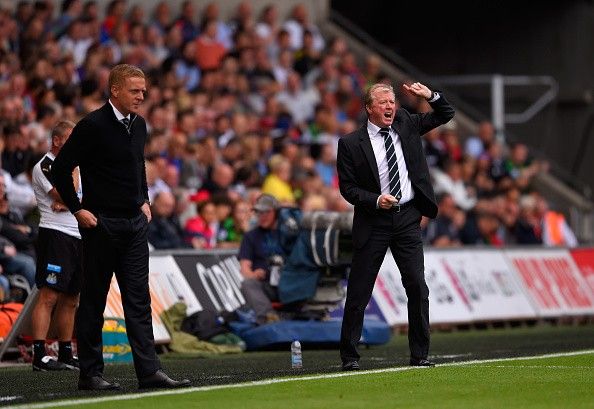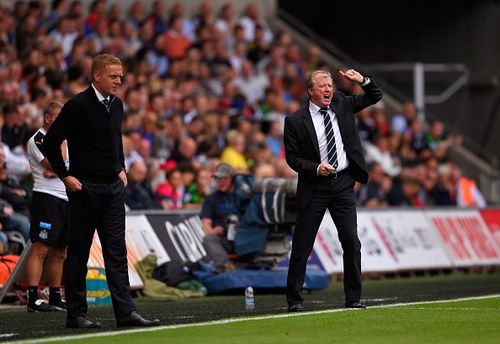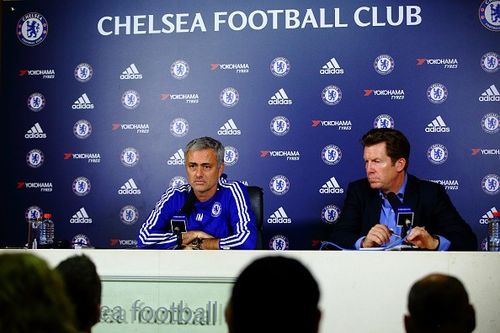
The Premier League and its managerial pressures
A shrug here, a strained smile playing at the lips, a glazed stare etc. are the poses of a manager in the dugout. Given that the Premier league is one of the favourite prime time sports for audiences across the world, it is safe to say that Premier League managers are constantly under a lot of pressure.
As per Deloitte’s review of football finance is concerned, the Premier League is the richest football league with an eye-popping figure of £3.26 billion. The Bundesliga stands second with £1 billion. To put it in perspective from a purely capitalist viewpoint; there is a huge pressure on clubs to be a part of such massive financial gains, which translates the pressure onto the managers.
The principle of energy – ‘Energy can’t dissipate and it can only be translated from one form to another’ can be applied to managerial pressure. Financial pressure translates into the scapegoat that is the “Manager”
So popular are the managerial race and the shenanigans surrounding it that betting sites actually offer odds on the next manager to be fired. A glance at the website oddschecker.com shows Garry Monk being given the best odds, followed by Steve Mclaren and steaming into third is the suave and charismatic and at times controversial, Jose Mourinho.
Let’s not forget that only a couple of months back; Garry Monk was being touted as the next big British manager, with one eye on the England job. He was being touted as the successor to Roy Hodgson. Father time, though has other ideas and Uncle Fortune and Lady Luck seemed to have taken their leave from the Welsh club, much to Monk’s chagrin.
In this circle of pressure that revolves around football, it is necessary to have viewpoints from both the Board as well as the fans. Expectations are to be managed by the Board in a manner which reflects a certain amount of reality.
View from the Board
The chairman and the board have a certain onus on themselves regarding how their club will develop. Board assurances and press conferences often can go both ways. A public backing at times generally props up the manager’s position and calms the vultures. Some managers think of a similar gesture as a reprimand or a slap on the wrist. Depending on results interpretations can be added to the narrative and can be fitted in.
Nowadays, a football club has become more appealing to billionaires and entrepreneurs as for them it is an expensive hobby which gives an adrenaline rush. Football clubs to them are entities which can make profits as well as garnering eyeballs. So for owners, it is always a balance between stability and short-term success.
There have been studies and statistics undertaken and Richard Beavan, the chairman of the League Manager’s Association, has time and again pleaded for patience. But given that football is always about winning, it is difficult for owners and boards to be patient.
Former manager’s often seem to rake up the coals and are all up in arms when they see a manager getting sacked. A layman peering in from the outside may smile at the folly and misfortune of the managers. But ask anyone involved in the football industry, and they accept it as a part and parcel of the profession. Risks are inevitable and while theorists may plead stability and patience, eventually the permutation of economics is what keeps a football club running.
Over the past few years, managerial sackings have increased in frequency. The high-profile exit of Brendan Rodgers followed closely by Dick Advocaat and Tim Sherwood shows the pressure. For the supporters of Villa and Sunderland, the manager’s positions were untenable, given their league position.
Liverpool instead just seemed to have lost the zing and when you have someone like Jurgen Klopp available, a smart man would bet on him. The circumstances prevailing at the respective clubs varied but the managers knew their positions were questionable. Understandably, the manner in which the clubs went about it is what raises more questions.
To be frank, the boards are also under huge pressure from the sponsors as they are the major investors. Investors at the time of signing such “deals” are all smiles and give press conferences about their privilege of being associated with such historical entities, but at the end of the day it is the bottom line that matters to them.
Similarly, managers have to present a team, which will entertain as well as accommodate expectations of the board. So when one says a manager should be given time, it shouldn’t “ring hollow” and there should be measures taken to actually let the manager do his job rather than hounding him.
Fans and the Press
When quizzed on the topic of managers, fans often seem to focus on the balance between winning and stability. While no football club would like their trophy cabinet to be empty, not all is lost when youth products and academies are able to provide a source of employment and joy around them.
A case in point is that of Southampton, who have been churning out products and internationals. Managers often may be in the line of fire but as Southampton and Swansea City have shown that there is a need to have a long-term policy with different managerial candidates innovating within those set parameters.
At times, this kind of structuring can be lauded and also it provides the manager a certain security in order to experiment. Instances of overspending can be avoided. Before taking up the Sunderland job, Sam Allardyce was voicing how it is important for the Chairman and the Manager to be on the same wavelength.
Only that can ease some of the unwanted pressure. Allardyce departed in acrimonious circumstances from West Ham United, but from a neutral point of view, it is hard to challenge his methods. The Hammers were rescued based on the manager and it seems Sunderland have reposed their faith in this same man.
Similarly, therein lies the role of the Press to not blow results out of proportion. Fans opinions are based on what they read in the news, rather than possessing inside information. Hence, it is a necessity for fans to not go looking for controversy in every instance.
The way forward
All said and done, any manager worth his salt knows the pressures associated with it. In the end, it is the thrill that keeps them going. How else would you explain the euphoric leaps and slides over the years of these charismatic personalities? The ability to crack a joke and laugh off controversies and to be able to please the fans is an achievement. In a system like this, the pressure on the manager can be regulated through a balanced approach.
The “balanced approach” is something the Board, fans and all stakeholders should deliberate. In the end, the faces may change but the club still remains. Football clubs are at the end of the day societal structures, but they need to always have that zing in order to attract younger fans. A manager’s role is primarily scrutinised because of the position and he being the figurehead, the onus is on him.
As, Maurizio Sarri, the current Napoli manager puts it he would have done the job for free. Similarly, most managers do know that they come into a club with a certain shelf life. Now how the shelf life is determined is dependent on fans and the club as well.


